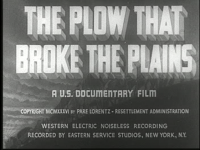
The River (1937) Full Movie
Uploaded by travelfilmarchive
The River is a 1938 short documentary film which shows the importance of the Mississippi River to the United States, and how farming and timber practices had caused topsoil to be swept down the river and into the Gulf of Mexico, leading to catastrophic floods and impoverishing farmers. It ends by briefly describing how the Tennessee Valley Authority project was beginning to reverse these problems.
It was written and directed by Pare Lorentz and, like Lorentz's earlier documentary The Plow That Broke the Plains, was also selected for preservation in the United States National Film Registry by the Library of Congress as being "culturally, historically, or aesthetically significant", going into the registry in 1990. The film won the "best documentary" category at the 1938 Venice International Film Festival.
Both films have notable scores by Virgil Thomson that are still heard as concert suites. The film was narrated by the American baritone Thomas Hardie Chalmers.
The two films were sponsored by the U.S. government and specifically the Resettlement Administration (RA) to raise awareness about the New Deal. The RA was folded into the Farm Security Administration in 1937, so The River was officially an FSA production.
There is also a companion book, The River [1] The text was nominated for the Pulitzer Prize in poetry in that year.
"The River" - Wikipedia
Wikipedia.- Pare_Lorentz
=====================================

Uploaded by PublicResourceOrg
Lorentz worked on the film with composer Virgil Thomson, who shared Lorentz's enthusiasm for folk music and incorporated many folk melodies, along with other popular and religious music, into the soundtrack. The film was narrated by the American baritone Thomas Hardie Chalmers.The Plow That Broke the Plains (1936) is a short documentary film which shows what happened to the Great Plains region of the United States and Canada when uncontrolled agricultural farming led to the Dust Bowl. It was written and directed by Pare Lorentz.
The film was sponsored by the United States government (Resettlement Administration) to raise awareness about the New Deal and was intended to cost $6,000 or less; it eventually cost over $19,000 and Lorentz, turning in many receipts written on various scraps of paper, had many of his reimbursements denied and paid for much of the film himself. Lorentz later faced criticism for appearing to blame westward bound settlers for the ecological crisis by having eroded the soil of the Plains with unrestrained farming (and one of his photographers, Arthur Rothstein, was criticized for moving a skull from one location to another in the Dust Bowl to shoot it and for other stagings in the film), but the film nonetheless succeeded in driving home the message of the severity of the problem caused by the misuse of land.
Virgil Thomson compiled a concert suite from his original score, which has been performed and recorded. One of the earliest recordings was for Vanguard Records with Leopold Stokowski conducting the Symphony of the Air; the original stereo LP also included a suite from Thomson's score for another Lorentz documentary, The River.
In 1999, The Plow That Broke the Plains was selected for preservation in the United States National Film Registry by the Library of Congress as being "culturally, historically, or aesthetically significant".
For John Deere's "Plow That Broke the Plains", see John Deere (inventor)#Steel plow.
Wikipedia- The Plow That Broke the Plains
=============================
If a picture is worth a 1000 words, a movie must be worth 1,000,000 words... two movies --> 2,000,000 words...
Today, many Food Production practices are still treating "Mother Nature" with disrespect, almost like she is our "Bitch"!...
Some of those with "controlling interests" in Food Production lack "Integrity"...
Can the grassroots change this?
How?
Ideas?
Thoughts?
With respect regards and respect,
Monte & Eileen Hines
Hines Farm Blog




No comments:
Post a Comment